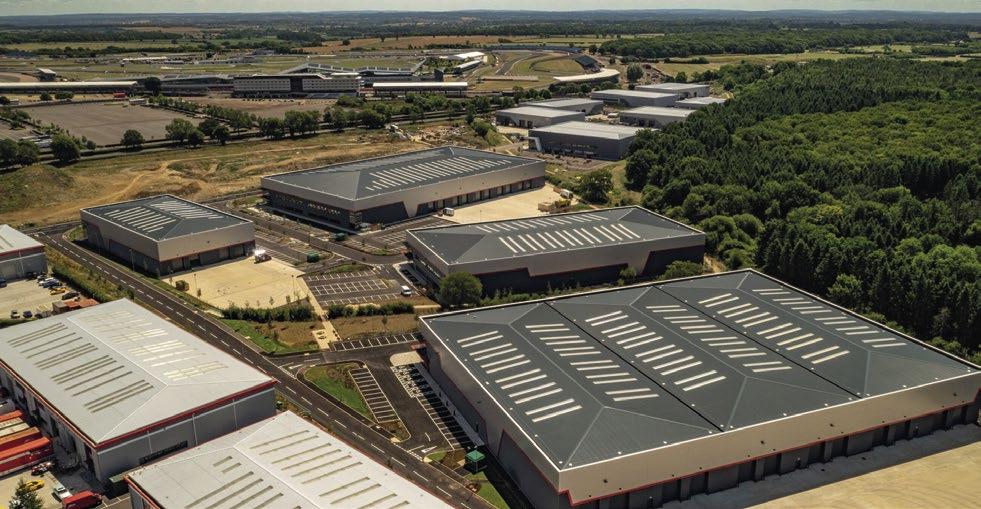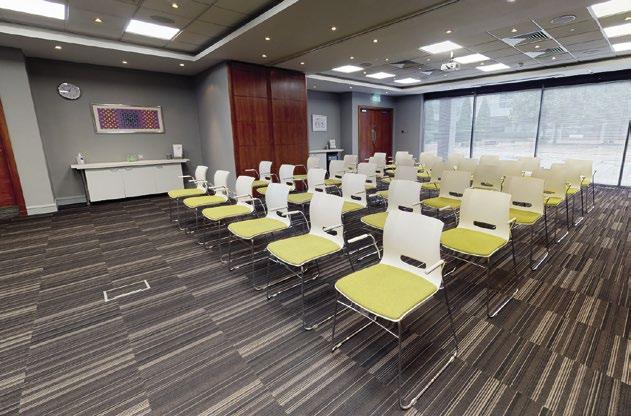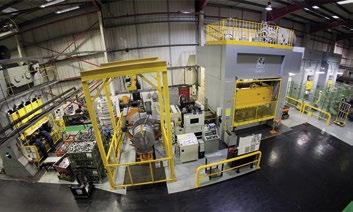
33 minute read
No relaxation for employers after holiday pay ruling
Legal Briefing No rest for employers after holiday pay ruling
The Supreme Court has handed down an important judgment in the long-running case of Harpur Trust v Brazel concerning the amount of paid leave that a part-year worker is entitled to.
A part-year worker is a worker employed under a permanent contract but works for varying hours each week and for irregular weeks through the year. This would include term-time workers and individuals employed under zero hours or casual contracts.
Under the Working Time Regulations 1998, all workers are entitled to 5.6 weeks of paid leave per year. For workers with variable hours each week of leave should be paid by reference to their average weekly earnings across the previous 52 weeks that they worked for their employer (the reference period). The reference period should disregard any weeks where work was not performed, going back up to 104 weeks to obtain a sufficient number of weeks to include in the reference period. The 52-week reference period came into force in April 2020. Prior to this, the reference period was 12 weeks.
Mrs Brazel worked as a visiting music teacher at a school run by the Harpur Trust. She was employed under a permanent zero hours contract which required her to work when needed during term-time and not during the school holidays.
As is common with employees working variable hours, the Harpur Trust paid Mrs Brazel for her leave using the percentage method. This involved counting the hours that Mrs Brazel worked in the previous term, calculating 12.07 per cent of this figure and paying her for that number of hours at her usual hourly rate. This is because 5.6 weeks is 12.07pc of 46.4 weeks (the whole 52-week year minus the 5.6-week annual leave entitlement).
The Harpur Trust argued that it was fair to calculate Mrs Brazel’s paid leave entitlement in this way as it reflected the amount of work that she actually performed.
Mrs Brazel contended that the percentage method led to her receiving less holiday pay than she was entitled to and argued that the Harpur Trust should have used the calendar week method. This involves calculating how many hours she worked in her previous 12 weeks of employment, multiplied by her hourly rate and divided by 12 to calculate a week’s pay.
This figure is multiplied by the period of leave up to the full 5.6 weeks per year. This method only took account of the weeks that she worked and would have resulted in Mrs Brazel receiving paid holiday entitlement of approximately 17.5pc rather than 12.07pc.
The Supreme Court agreed with Mrs Brazel that the Harpur Trust should have adopted the calendar week method when calculating her paid leave. They recognised this would put Mrs Brazel in a more favourable position than her full-time colleagues as the pay that she received for leave would be a higher percentage of her annual salary than a worker who works throughout the year.
The percentage method is contrary to the regulations, the court said, and is therefore an unlawful way of calculating paid leave entitlement, even though this may appear to be a fairer way to proceed. The Supreme Court noted that this method does not use a week’s pay as required by the regulations and that there is nothing in the regulations preventing a partyear worker from being treated more favourably for holiday entitlement purposes.
This decision confirms that employers should not use the percentage method to calculate paid leave entitlements of part-year workers. Doing so is likely to cause a shortfall in paid holiday entitlement and will expose employers to claims for unauthorised deduction from wages and breach of the regulations. Employees can usually claims shortfalls in holiday pay going back two years and therefore the liability may not be insignificant, depending on the number of staff affected.
Instead, employers should adopt the calendar week method and ensure that part-year workers receive a full 5.6 weeks of leave paid by reference to their average weekly earnings across the previous 52 weeks, excluding weeks not actually worked.
Where a part-year worker has worked for their employer for less than 52 weeks, their total worked weeks should be used instead. However, the judgment confirms that employers are still able to require workers to take their leave at specific times, such as during school holidays or seasonal industry closures.
This decision is likely to present problems for employers who engage term-time or casual staff. The percentage method referred to above is a common way to calculate holiday for such staff because it is easy to use. Calculating holidays for term-time or casual staff in accordance with the Brazel judgment will be more complex and time-consuming and the employer will need to give careful thought as to how to implement any necessary changes. Staff who deal with calculation of holiday entitlement and pay will likely need further training to get it right.
This decision applies where there is an ongoing contract between periods of work. Employers may consider whether part-year workers actually need to be employed under continuous contracts. In some cases, a shorter fixed-term contract may suffice.
A Supreme Court ruling on a case involving holiday pay and the Harpur Trust in Bedford has ramifications for employers. Nicola Smyrl, partner at Taylor Walton Solicitors, explains.
Nicola Smyrl
n If you have any queries about the issues raised, Taylor Walton’s employment team can assist and provide guidance and training to your business. To find out more, visit taylorwalton.com/employment-law/
Chartered Accountants and Tax Advisers
Independent member of

Keeping your business moving
As HMRC listed agents, our customs advisory and declarations service is designed for SMEs. We can help keep your goods moving and avoid delays. Speak to our expert customs team to find out how we can help you.
01908 232 020 hillierhopkins.co.uk
Preparing your business for sale
You’ve worked hard for years, decades or maybe even generations, at building your business, caring for your employees and valuing your customers loyalty. The day-to-day operations are running smoothly, and you’ve put time and thought into your long-term strategy, but have you thought about your succession plans? In other words, do you have an exit strategy?
It is inevitable that one day you will need (and want) to step away from the business you’ve built, but many business owners do not put the same time and effort into planning for their exit as they do for day-to-day operations and growth strategy. Maybe this is because it’s easier to prioritise short-term projects, hard to imagine not being a part of the business’ future, or simply thinking that exiting a business is easy.
What exit options do I have available?
Passing on your business to family members
Employee succession planning • Management Buy-Out • Employee Ownership Trust
Business sale
Turning the key, shutting the door and walking away
Tax implications on these options can vary dramatically. Preparing your business for sale will put strain on you and your business during the sales process. Investing time before the process begins will help you during the process, maximise your exit price and give your staff and customers the thought they deserve when you’re negotiating and securing their future. Don’t underestimate the amount of time planning takes. It is time intensive. Build your team of experts When it comes to planning for what is likely to be the biggest deal of your career, it makes sense to pick your team of experts carefully. A good advisor will pay for themselves in the experience and advice they bring to the party. Particular attention should be paid to selecting your legal and accountancy team, as throughout the process there will be many legal documents which will need preparing, interpreting and reviewing, as well as advising on courses of action where applicable.
A good firm of accountants will provide experience in a number of areas throughout all stages of the sales process; from the valuation of your business, presenting key information in due diligence, tax planning and help to ensure you get the best deal possible. They may also be able to introduce you to good brokers and sometimes even perspective buyers.
Final tips What are your plans after your sale? Are you planning or thinking of staying within the business for a period of time, or do you want to be walking off into the sunset? It’s worth considering that certain buyers and types of sale will expect an earn-out period where you will continue to work within the business or as a consultant for an agreed period.
If you have read this and it has got you thinking about your exit plans, we at Ad Valorem would be pleased to discuss them with you to explore your options and start the planning process early.
Contact us using the details below to arrange an informal discussion.
Business sale process?
Pre-Sale planning Finding and Choosing a Buyer (under NDAs) Negotiations Heads of Terms Due Diligence Exchange & Complete Earn-Out Period
Planning should start at least 3 years before entering the sales process. Where to start? Before you enter into the sales process, work out what you need from the sale. Without this figure, it will make negotiations extremely tough for you. It will also give you a benchmark against the current value of your business, to identify whether any changes need to be made in advance of entering the sales process. There are different methods for calculating the value of a business, which can be dependent on the type of business or sector you are in. For example, in the IFA and accountancy sectors, the valuation is based on a multiple of their fee income/turnover, but profitability will still play a part in determining the multiple.
Valuation methods:
Cashflow Forecasting
EBITDA multiple (with normalisations)
Asset basis
Turnover multiple
Getting your finances in order It is important to have an accurate and up-to-date picture of your business’ financial information. Think about how you currently monitor your financial performance and if perspective buyers will be able to understand and interpret your current reporting methods. It is good practice to whittle your financial performance metrics down into a handful of Key Performance Indicators (KPIs), which are recorded and analysed monthly. Getting away from spreadsheet management is also a wise move, so the data is populated digitally with a clear audit trail.
Start this now, so...
You can see where you are today, compared to your exit goal number
You have a record of your KPIs over a period of time
You can take action to maximise your value at the time of your sale
How instrumental are you to your business? Whether you’re looking for a full exit as soon as possible or planning to stay in the business for an earn-out period, your buyer will be looking to identify how crucial you are to the day-to-day operations and the number of strong relationships you hold with your customers. Considerations
Do you have a strong/weak management team?
Are your processes documented?
Are you in any long-term contracts or agreements?
(e) enquiries@advaloremgroup.uk (w) advaloremgroup.uk (t) 01908 219100
Tax&Business Consultancy

Our specialist team provide a range of services and advice including EIS/SEIS, Embedded Capital Allowances, Land Remediation Relief, SDLT, HMRC Enquiries, Share Schemes and M&A. Bring your finances into real-time with our Cloud Accountancy Packages. As Xero Award Winners, we have the experience to implement and train your team on Xero. We provide a range of Audit and Assurance services, with our experienced team guiding you through the process. We are proud to be regulated by the ACCA and follow their high technical and ethical standards.
Cloud Accountancy Audit R&D
Eligible for R&D Tax Credits? We can help identify your eligible projects and ensure all qualifying expenditure is captured within your claim, to save you the tax you deserve.

Silverstone Park operator MEPC has completed its latest Phase 3 development, adding a further 265,000 sq ft of industrial accommodation to the estate.
The development pictured above
comprises four properties, two of which have been let prior to completion. Engineering solutions provider KW Special Projects has located its business to around 28,700 sq ft of space. Niche vehicle electrification business Lunaz is quadrupling its presence on the park by moving into 98,000 sq ft.
“Phase 3 has been a successful project in spite of some supply challenges related to the pandemic which affected multiple trades,” said MEPC’s development director Chris KimberNickelson. “Architecturally, each property is a progression of the designs we saw during Phases 1 and 2. They are strong on energy efficiency and look terrific for the businesses occupying them.”
The spine road through Phase 3 has been fully asphalted and is now open, linking businesses direct to the earlier Phases 1 and 2 of development.
“What is also really exciting about the businesses being attracted to our new buildings is the activity behind their front doors,” said Mr KimberNickelson. “The technology they are developing and projects they are working on are off the scale and they are creating many high-level jobs and skills.”
MEPC has already been granted planning consent for its Phase 4 of development - a 100,000 sq ft scheme to include hybrid industrial units, with smart offices, a nursery, gym and café. An application for planning consent for Phase 5 - more than 201,000 sq ft of industrial premises on land opposite the main entrance to Silverstone Circuit - has also been submitted.
Software firm extends fintech contract deal
Fintech software provider Solifi has won an extension to its contract with British Car Auctions to support BCA’s wholesale finance offer.
The Partner Finance service supports dealers purchasing vehicles in BCA’s online sales, funding the whole auction purchase exclusively at BCA, including fees and VAT where applicable. Solifi’s softwareas-a-service technology offers BCA’s customers using the scheme greater flexibility in decisions they make on stock and wholesale financing of dealer inventory. The service frees up capital to enable investments in growth.
BCA Partner Finance processes more than 100,000 contracts and £1 billion of funding per annum.BCA’s headquarters are in Bedford.
“The latest cloud-based version of the Solifi Wholesale Finance platform will support our unique digital buying and funding journey for motor dealers and is scalable as we continue to expand our wholesale finance operation,” said BCA Partner Finance managing director Malcolm Thompson. “The platform is highly configurable to our needs, easy for our trading partners and dealers to use and expedites the time it takes to add new products.”
James Redfern, vice president sales, EMEA at Solifi, whose UK headquarters are at Linford Wood in Milton Keynes, said: “We are excited to continue our long-standing partnership with BCA as they invest further in their wholesale finance offering. This is a fantastic endorsement of our wholesale finance platform.”
Solifi comprises IDS and White Clarke Group in Milton Keynes and US-based William Stucky & Associates.
You’re invited!
Come and experience our newly refurbished Academy Meeting Centre at The Holiday Inn Milton Keynes Central.
Join Oana and the team for a look around our fantastic meeting and event facilities, enjoy a taste of our food and drink offering and enter our free prize draw to win your next meeting with us for free!*
Wednesday, 14th September 2022, 10am to 4pm
RSVP to sapna.abbasi@lghhm.com by Friday 9th September
* Complimentary Day Delegate meeting for up to 10 people in one meeting room



Published on behalf of the South East Midlands Local Enterprise Partnership
Investing in innovation - does it really unlock prosperity?
by DAVID BAILEY non-executive Board Director, SEMLEP
MUCH is made of the need for the UK to invest in innovation to drive prosperity. It’s a straightforward message and a beguilingly easy solution to sell at a time when the UK is facing severe pressures on currency, supply chains, workforce, skills, and access to markets.
It’s been a plank of government policies since the 1970s and 1980s as a driver to reverse a long period of relative UK economic decline against our international neighbours. Can innovation continue as a catalyst to enable the UK to prosper? If it might, is investment in more innovation beneficial?
I won’t attempt to review 100 years of econometrics and national policy in a short article. I will get straight to the point: investing in innovation DOES unlock national prosperity.
Yes, it does…
‘Think tanks’ of various political colours and ideologies have produced lengthy papers on innovation for prosperity. Some that come quickly to mind are the OECD 2007 Innovation, Growth and Equity: The Equation for Prosperity, Brooking Institute 2011 Technology and the Innovation Economy, the National Institute for Economic Review 2013 Investing for Prosperity: Skills, Infrastructure and Innovation, CIFAR 2019 Innovation, Equity & The Future of Prosperity and NEISR 2021 From ideas to growth.
The majority-accepted view is that there is a strong correlation with some known causation that indicates that increased investment in innovation leads to higher national prosperity in the medium to long term.
The UK government finds that each £1 of investment in innovation generates a 20% rate of return. This is within the bounds of OCED, World Bank and EU studies over decades.
They all find that rates of return to private investment in innovation of 0% to 60%, with most firms seeing 20% to 30%, and national prosperity returns to public sector investment are in the range of 0% to 100% with most being in the band of 30% to 50% because of the amplification and spillover effects of the rest of economy.
Innovation activity may be a relatively small proportion of the economic and social activity in the United Kingdom but it has a disproportionately fast-growing effect on everything around it.
Which is why we pay it so much attention and try to nurture the fragile little sparks into useful flames.
By the magic of compound growth, every year builds upon the year before. Over 20 years, a 20% rate of return turns £1 million into £32 million, and a 50% rate of return creates £2.2 billion. Clearly, we are highly motivated to ensure we target the top end of that range of returns. 12 Business MK | September 2022

David Bailey is an expert in structuring and strategy. “I find the pathways and components of unexpected solutions to enable founders, investors, and property owners to fix the hardest of problems,” he says.
“I help them to unblock and accelerate growth; unlock and realise value rapidly; and invest wisely for maximum gain.” He is a private sector board director of SEMLEP and a member of Northampton Enterprise Zone, Luton Airport Enterprise Zone, the Finance Risk and Advisory Committee and Inward Investment Group.
…but not always ...and not without help
It’s a big, complex, and confusing area of study and it is what is under the headlines that really matters. Let’s look at a few of the most important areas:
Investment alone does not automatically lead to innovation
Common sense, backed up by multiple studies, suggest that merely throwing money at a problem will not solve it. Investment yields higher returns in areas where there are positive pre-existing conditions.
You always get more back in social and financial terms where you already have universities, connectivity, bandwidth, a reasonably dense built environment, and a concentration of industries that have already recognised the need to innovate. Fortunately, the Oxford-Cambridge Arc, and the Southeast Midlands region is blessed with those factors.
Innovation does not happen without help
Innovation is a learned skill. It is not the same as invention. It is not the same as random creativity. It is a focused collaborative process over many years which seeks out and identifies opportunities, creates concepts that can be developed, validates those concepts against the real world, develops working solutions for those concepts, and then deploys those working solutions in profitable manners.
It requires that the region, and the nation, has the skills, management, built environment, data collection, systems of releasing value, and ways of assigning investment to valuable propositions, all functioning seamlessly and without friction.
Benefits are not distributed evenly
The truth of innovation is that before it generates prosperity, it generates disruption. It is true that jobs may be lost when a more efficient process is discovered, It is true that some regions benefit more than others from the introduction of new technologies. It is true that different demographics benefit at different times and in different ways from the spread of prosperity.
In the long run, the evidence is overwhelmingly that innovation generates social and national good. In the short to medium term, compromises need to be made. Managing that is the thing that we like to call politics.
It is not all about money
Many of the examples above have been given in financial terms, but the effects go much wider. Innovation can change our health, our journey to work, the way we spend our leisure time, how we process waste, how we get water, what pollution we generate, and how we are educated.
What SEMLEP does with this
As board members of SEMLEP, we work hard to ensure that this region has a powerful base of skills that can manage innovation, innovate, and exploit innovation effectively. We have a great team focused specifically on skills with a depth of experience across universities, industrial training, and broader life learning. They produce the excellent Skills Strategy for the region.
A core team creates the evidence base from which the Regional Economic Plan emerges by way of broad and deep studies from existing reports and by the regular Business Survey across the region.
When the team is faced with sudden changes in the economic environment, as we just had from Brexit and Covid, it is able to pivot and produce Recovery Strategies as well.
Importantly, all that information enables SEMLEP, together with our partners locally and nationally from the public and private sector, to focus effort on unlocking innovation in areas and sectors that have proven abilities to deliver returns locally: n High-performance technology n Future of mobility n Zero carbon future n Manufacturing and advanced technology n Logistics and supply chain n Creative and cultural industries n Aerospace and space technology
Inward Investment
Armed with that, and powerfully so, SEMLEP can reach out across the Economic Development Officers in local authorities to coordinate and facilitate inward investment, whether from foreign or national sources. Precisely because the region has such deep and rich advantages, it has a long history of capturing significant amounts of inward investment and directing it towards the innovation challenges that will really matter; both for SEMLEP area, and for the United Kingdom as a whole.
Is it all worth it?
Investment can create additional innovation if it is put in the right place with the right skills and the right people and the right sector. That innovation can drive financial and social gain that compounds and grows dramatically if it is managed and nurtured correctly. Relatively small investments, and relatively small changes in can have substantial benefits in the future. So, while the short answer is “Yes”, the long answer is “Yes, but only if a lot of dedicated people put a lot of time and effort into managing the detail carefully”. And that, I think, is part of why volunteering for SEMLEP has been so amazingly rewarding for me, and each and every one on the SEMLEP board. For local business news visit www.BusinessMK.co.uk
Money Matters Structure assets in the business to keep the tax man at bay
There are ways to shelter assets to protect them from Inheritance Tax. Tony Byrne, managing director of Wealth & Tax Management, explains.

Tony Byrne
Many SME business owners are aware that their trading businesses become free of Inheritance Tax after two years of ownership. However, not all of them realise that by building assets within their businesses - typically bank deposits and properties - they may well be jeopardising the ability of their business to claim 100 per cent business relief against IHT if they were to die after two years of ownership. Why is this?
There are two main types of businesses: trading and investment businesses. Business relief against IHT is only available for trading businesses, not investment businesses.
The problem is that trading companies can unwittingly become primarily investment companies if they accumulate assets such as investment properties and large bank balances. Sometimes such companies cease their trade completely and become 100pc investment companies.
When the owner dies, HM Revenue & Customs will calculate how much of the value of the business is comprised of the trade and how much of it is investment. Only the trade element will qualify for 100pc business relief.
A big disappointment for the beneficiaries of the estate. So how do you overcome this challenge?
The simplest thing to do is not to allow large nontrading assets to build within the business by distributing surplus profits to the shareholder(s). A smarter way is to structure your business in such a way that the assets within it are bona fide business assets thus not jeopardising the business relief rules.
For example; if the trade of the business is a hotel, owning hotels is classed as business assets. After all, you cannot run a hotel without owning or renting a building. If you have surplus cash, you could turn your business into a finance company and become a lender. You may even be able to argue that a large bank balance is simply needed for working capital.
For advice on tax mitigation for your business, take advantage of a one-hour Discovery Meeting either at our offices or by a video conference call at our expense worth £270 to each of the first three readers who contact
n The contents of this article are for information purposes only and do not constitute individual advice. You should always seek professional advice from a specialist. All information is based on our current understanding of taxation, legislation and regulations in the current tax year. Any levels and bases of relief from taxation are subject to change. This article is based on my own observations and opinions.
Bona fide business assets do not jeopardise rules on relief
us before September 30. You know it makes sense. We offer a great cup of coffee too.
Ring us on 01908 523740 or for free on 0800 980 4516 or email wealth@wealthandtax.co.uk. £
£www.wealthandtax.co.uk
No fee but exactly the outcome sought on behalf of a client. Tom Guthrie, director at business recovery and insolvency specialist BRI in Milton Keynes, tells more.

It’s what we call a win-win scenario
“What can we do for you today, sir?” “The usual short back and sides please.” “Of course sir but while you’re here ,any chance you can save my business?”
We have only gone and done it again after a company director was recommended to speak to BRI with a view to liquidating a hairdressers. An initial chat - which did not involve “going anywhere nice on your holidays?” - identified an opportunity to cut costs enough to give the company time to trade on and explore a potential sale of the business.
And this conversation proved very valuable to the company as it was subsequently able to market and then sell the trading business for fair value.
With the goodwill of the business having been preserved due to the continued trade, a better sale price for the business was achieved than is likely in an insolvency process - quite possibly no realisation would have been made in a liquidation - while the continued employment of staff was also assured.
It is what we would call a win-win scenario.
Also, the director - despite no longer having the business which had been sold - was able to create a revenue stream via the rent that was now being received from the business continuing to operate from the premises which he owned.
Such a situation represents the exact type of outcome that we are always so glad to achieve for our clients. Did it result in a fee for BRI? No. Did it achieve the best outcome for all parties concerned? Yes.
This underlines our commitment to always seeking to provide the right advice first time every time regardless of the fee outcome for ourselves.
n If you or any of your clients find yourselves in a time of need and could benefit from our approach, please do not hesitate to contact us on 01908 317387.
Tom Guthrie
IS YOUR BUSINESS SUFFERING?
We can ease your financial headache.
Whatever your circumstances, trust BRI to help you get your business back on track.
From business recovery to CVAs, administration, debt advice and more, our highly-qualified insolvency experts are dedicated to giving you the best advice.
Whatever your business financial concerns, talk to BRI – we can help you on your way to a healthier future. Our services: • Restructuring • Corporate Insolvency • Personal Insolvency
For a FREE, CONFIDENTIAL and NO OBLIGATION consultation Call now on 01908 317387
‘Troublesome autumn’ looms for companies in distress, warns expert
Businesses in the retail, health and education sectors are bearing the brunt of ongoing financial hardship, says new research.
More than 2,700 businesses in Milton Keynes were in “significant” financial distress during the second quarter of 2022, according to figures from corporate restructuring specialist Begbies Traynor’s Red Flag Alert, which monitors the financial health of British companies.
The total of 2,789 represents a one per cent increase on the previous quarter but remains 12pc down on the same period last year. Retail sector businesses in trouble rose by 10pc, while health and education increased by 8pc.
“Companies were hoping for an economic boom after the pandemic,” said Julie Palmer, Begbies Traynor’s partner in Milton Keynes. “But that has simply fizzled out as a combination of economic issues have taken their toll, reducing both business and consumer confidence. Indeed, rising insolvency rates, combined with our own anecdotal evidence from speaking to the directors of distressed companies, highlight the impact of rising costs on businesses.”
Nationally, the Red Flag Alert recorded almost 582,500 businesses in significant distress, hit by rising inflation, higher labour, material and energy prices and faltering consumer and business confidence. Evidence comes in the form of County Court Judgement data, which some consider an early warning sign of future insolvency. CCJs were up by 5pc to 46,235 as creditors tried to recover debts. Just over 59,000 CJs in total were made in 2021 and Begbies Traynor says this year’s figures to date reflect the backlog in the courts being cleared and debts are pursued.
Ms Palmer said: “Many are fighting on but the environment is only going to get worse, not better, at least until next year. I fear it will be a troublesome autumn as businesses which have struggled for so long are finally overwhelmed. It is so important that businesses facing financial difficulties should seek professional advice to fully understand the options available.”
Promotion
Exhibit at MK Job Show and meet the future stars of your business
More than 70 of the region’s best employers will meet with thousands of jobseekers at the MK Job Show, which is returning to centre:mk on September 23-24.
The region’s biggest recruitment event will welcome sponsors Lockheed Martin, Greene King, Network Rail, BP Pulse, Metropolitan Police, Copart, British Transport Police, Santander, Ingram Micro, MK NHS Trust, Nikon, Ministry of Justice and the University of Bedfordshire - MK Job Show’s main sponsor.
MK Job Show will be in the middle of centre:mk, the region’s busiest shopping centre, attracting more than 100,000 people every Friday and Saturday. On top of this more than 10,000 jobseekers have pre-registered to attend the event having seen our marketing campaign.
For the event this September, the MK Job Show is activating its biggest advertising and marketing campaign to date: n Radio adverts on MKFM every hour; n 50,000 MK Jobs Newspapers going out across the region in the first week of September; n Targeted TV adverts on both Sky and ITV leading up to the event; n Electronic posters displayed throughout centre:mk; n Special AA signage directing people to the event; n The largest targeted paid social media campaign on Facebook, Google and LinkedIn to date.
By meeting tens of thousands of people, employers can quickly identify suitable candidates for their vacancies. Many will hold a first stage interview at the event, with strong candidates booked in for further interviews in the weeks after.
Over the years employers have hired thousands of new people at the MK Job Show. Your organisation can do so this year. Exhibition spaces are still available for employers.

n Contact us now to find out more. email info@jobshows. co.uk
Manufacturer calls in the administrators
Component maker succumbs to sector challenges
One of the last independent pressed and sheet metal component manufacturers and die casters in the UK has gone into administration.
Broadways Stampings and its sister company Dyson Diecastings have succumbed to the challenging environment facing the UK’s automotive supply chain.
Ryan Grant and Chris Pole, from Interpath Advisory, have been appointed joint administrators. The companies continue to trade at their factories on the Denbigh industrial estate in Bletchley while the administrators seek buyers for the businesses and their assets.
“We have been pleased with the positive conversations and financial support provided by customers, which has ultimately provided the businesses with a crucial lifeline,” said Mr Grant, managing director at Interpath Advisory.
The two companies employ more than 300 staff. Founded in 1976, Broadways Stampings manufactures pressed component parts, sheet metal work, welded assemblies and powder coat finishing to the automotive industry.
However, the cumulative impact of Brexit, the pandemic, the rising cost of raw materials and energy, supply chain issues and shortages of essential components and labour led the companies to seek urgent additional financial support from their customers in order for production at their sites in Bletchley to continue.
After a series of “productive” discussions and having secured customer support, the directors took steps to protect the interests of creditors by seeking the appointment of joint administrators.
Mr Grant paid tribute to the support and understanding of the companies’ employees as the administration process continues. “Broadways Stampings and Dyson Diecastings are proud family-owned businesses with a long heritage of manufacturing and supplying specialist products to the UK automotive industry,” he said.
“Unfortunately, the myriad of issues facing the sector over the past two to three years have had a significant negative impact on the companies, resulting in the directors needing to take proactive action to safeguard the businesses’ future. Our priority is now to work with suppliers to reestablish and ramp up production at the sites while we explore interest in the businesses and assets.”
Interested parties should contact Gareth Shaw at Interpath via gareth.shaw@ interpathadvisory.com.Broadways Stampings’ factory at Denbigh West

LET US MAKE YOUR YEAR
Request a call back

• Partner with us for your tailor-made Charity of the Year programmePersonalised programme with your company’s objectives and values in mind • Dedicated Willen Hospice corporate account manager • Raise your profile amongst staff and customers • Engage employees and boost morale with team building opportunities Call our Corporate Fundraising team on 07522 564294 Or visit www.willen-hospice.org.uk/partnership-programme
PROUDLY SUPPORTING PROUDLY SUPPORTING
MK Business Leaders Partnership Inclusivity should run through the heart of every business
Just a few short months ago, I stood in front of a packed ballroom at Stadium:MK and pledged that next year’s Milton Keynes Business Achievement Awards would be the biggest and best yet. Already we are several steps closer to achieving that ambition.
For me as chair of the Milton Keynes Business Leaders Partnership, September 8 will be a big day as we host the launch event for MKBAA 2023. It is also be the date that entries open so that people can begin to call out the brilliant achievements in businesses around the city.
Already, we have selected our theme for MKBAA 2023: Celebrating Diversity. Milton Keynes is full of fantastically diverse communities and businesses and we feel that many workplaces are cultivating a thriving culture for people from all backgrounds. Inclusivity should run through the heart of every business and we look forward to celebrating that at our next awards.
As I stood on that stage in March, not only did I encourage our sponsors to once again get involved but I also implored others to do so. I promised to make the forthcoming awards the best yet but that can only be done with the support of some of Milton Keynes’ best and most prominent businesses. I am proud to say we have already secured repeat sponsorship from some of 2022’s sponsors, with headline sponsors Milton Keynes Council and The Open University and category sponsors DBFB and Integral Powertrain all wanting to go again. And we have many more with whom we are currently negotiating.
But there are still plenty of opportunities to get involved and, as any of our sponsors will tell you, sponsorship presents your company with a great opportunity to become known by the very best and brightest businesses in our fabulous city.
This year’s event will be a landmark as it will be the first to be held since Milton Keynes officially gained city status. So there has never been a better time to be noticed in one of the most thriving and fastest-growing cities in the country. Now is the time to shout about your achievements.
Participation in the awards gives you a wonderful opportunity to spend the night among some of the city’s business elite and, regardless of winning, you will have the chance to network with some of the most talented business owners and individuals that this city has to offer.
Win… and the sky’s the limit.
In addition to the usual qualities that they look for, the judges will also be looking for those who not only celebrate diversity but who embrace it as part of their day-to-day activity. We want to hear from a wide spectrum of great businesses so that we can celebrate what makes you who you are. So please do not be one of the city’s best kept secrets. Now is the time for you to shout about who you are and what makes you great. Who knows where it may lead?
I know very well the strength, tenacity, and brilliance of this city and I cannot wait to see the high standard of entries that we will undoubtedly receive, proving once again why Milton Keynes is the best city in the UK.
Diversity is thriving in workplaces throughout Milton Keynes and is the theme of the MK Business Achievement Awards 2023, which launch this month. Nicholas Mann, chair of the awards organisers, looks ahead

MKBLP chair Nicholas Mann on stage at the Milton Keynes Business Achievement Awards 2022




